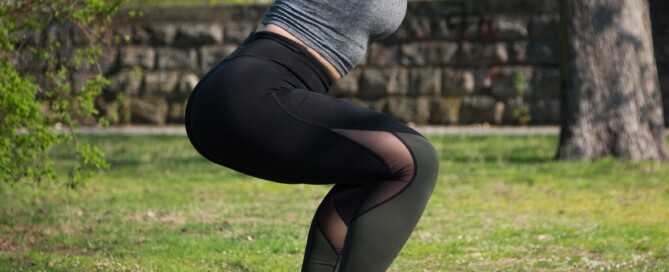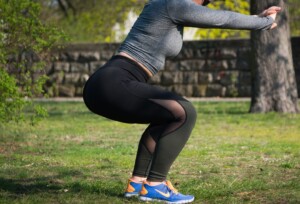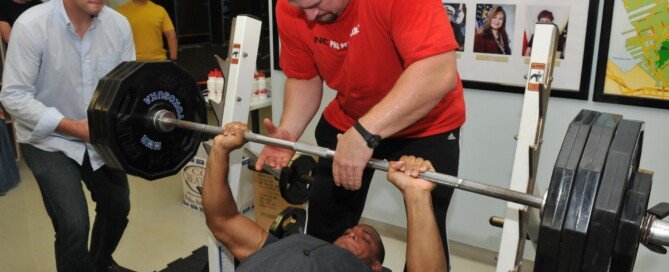Will Exercise Lower the Risk of Colon Cancer?

The type of exercise that will lower the risk of this disease isn’t strenuous at all.
But exercising now to lower your risk of colon cancer, reports a study.
The correlation between exercise and colon cancer is substantial, according to study results from researchers at Washington University School of Medicine, and Harvard University:
Study subjects who exercised the most had a 24 percent lower chance of getting colon cancer, than people who exercised the least.
What’s particularly compelling about this study is that the link between this disease and exercise was demonstrated in spite of how the exercise was measured in this study, says Kathleen Y. Wolin, Sc.D., lead author of the study, which was reported in British Journal of Cancer (2009).
Even if you’re young, lowering the risk of colon cancer is yet one more reason to start exercising, and if you already are, to stick with it.
About 10 percent of people with this disease are diagnosed when they are younger than 50.
The Washington U. study (which analyzed studies dating back to 1984 on the link between exercise and colon cancer risk) suggests that there’d be 24,000 fewer newly diagnosed cases of this illness per year in the U.S. – if people would just get moving more.
The “exercise” that’s cited in these findings includes on-the-job physical activity (including walking a lot on the job), as well as recreational exercise (walking, bicycling, swimming), and of course, more structured exercise such as gym workouts or fitness classes.
If you’re having difficulty sticking to an exercise regimen, start thinking in terms of cutting the risk of colon cancer.
Sedentary people are more likely to get colon cancer than are active people.
Activity should also be more than just the walking you do on the job or any housework or yardwork that you do.
Structured exercise (aerobic and resistance) are very important for lowering the risk of colon cancer.
Guidelines for Those of Any Age Who Are New to Structured Exercise

Freepik.com
1 Do both aerobic and strength training workouts, but not on the same day.
2 If you use a treadmill, do not hold on. This is unnatural and can lead to repetitive stress injuries and loss of balance. Use a slow pace in the beginning.
3 Focus on “big” multi-joint exercises when it comes to weight machines or free weights. These would be leg, back, chest and shoulder exercises. Isolation exercises like curling dumbbells or side raises with dumbbells should make up a small percentage of your overall weightlifting regimen.
4 Make sure you’re using good form. If you’re not sure, have a personal trainer evaluate you.
5 If you’re having trouble staying motivated, remind yourself that active people have a lower risk of colon cancer.
 Lorra Garrick is a former personal trainer certified by the American Council on Exercise. At Bally Total Fitness she trained clients of all ages for fat loss, muscle building, fitness and improved health.
Lorra Garrick is a former personal trainer certified by the American Council on Exercise. At Bally Total Fitness she trained clients of all ages for fat loss, muscle building, fitness and improved health.
Source: sciencedaily.com/releases/2009/02/090211193822.htm
Top image: Freepik
Melanoma Obsession? How to Manage Melanomaphobia

Are you constantly worrying you have melanoma or will soon get it?
Does your mind race with all sorts of scenarios of this cancer invading other parts of your body? (more…)
Why Don’t More Parents Use Door Alarms for a Wandering Child?

An alarm on a door will alert parents when their child is trying to leave the house: a child prone to wandering or sneaking out.
Top Reasons Anorexics Want to Be Thin
Anorexics have very disturbing reasons why they want to be thin – reasons that differ from why “normal” women want to be thin. Some reasons defy logic.
Many women want to be “thin.” And a woman with a healthy sense of self will put limits or a cut-off point on how much weight she loses. (more…)
Should Lake, Pond Be First Place Searched for Missing Child?

While people are searching a body of water for a missing child, might the child still be alive somewhere else and in danger?
At what point should all focus be on searching nearby lakes and ponds for a missing child? (more…)
Snot Stuck in Back of Throat when Swallowing: Cause, Solutions
Euwww, do you feel boogers stuck in the back of your throat when you swallow?
This gunky “snot” is stuck there for a reason & here’s what you can do to help prevent this from happening.
Twitching Muscles from Squatting: Causes & How to Prevent
Are you annoyed, curious or scared because squatting has caused twitching muscles?
There’s a reason why the motion of squatting can trigger a muscle to twitch.
So what kind of squatting are we talking about? It can vary.
• Squatting in the garden
• Squatting around the house to pick things up
• Squatting at the gym — with a barbell across your back; holding kettlebells at shoulder level; deep repetitive body-weight squats or those with weights.
Shutterstock/Pressmaster
The squatting that most likely will cause muscle twitching is the kind done for exercise, and especially if it’s done intensely.
There is nothing inherent about squatting, vs. other leg exercises, that will more likely cause twitching muscles than other movements such as the leg press, hamstring curl, lunge or leg extension.
Squats engage the glutes, quadriceps and hamstring muscles. These are big, strong muscles that are designed to support a lot of resistance.
• Back squatting a 225 pound barbell
• Deep squatting while holding a 30 pound kettlebell in each hand at shoulder level, then pressing the weights overhead upon rising from the squat—12 repetitions.
• 25 to 50 deep squats while standing on the flat side of a BOSU board.
• Jump squats: squatting to at least parallel, then exploding upward into a jump off the floor, for 12 reps.
• And so many more squat-based movements like lunge jumps, box jumps and weighted walking lunges.

Shutterstock/Undrey
Any kind of intense squatting exercise is excellent for the lower body and core, and is one of the best calorie burners and fitness builders out there.
Along the way there may be some twitching muscles (legs, glutes) right after, or a short time after, the squatting routine.
The twitching may last for a few hours. It may carry over into the next day. This is nothing to worry about.
Why does squatting cause muscle twitching?
• Quite simply, you hammered your muscle fibers.
• They are buzzed and very fatigued.
• The twitching may be caused by a shortage of valuable minerals, especially magnesium.
Magnesium Post-Workout for Twitching Muscles

“Magnesium should be taken daily in divided doses,” says Carolyn Dean, MD, ND – Medical Advisory Board Member, Nutritional Magnesium Association.
“Magnesium is known as the anti-stress mineral and is one of the key electrolytes along with sodium and potassium that needs to be replenished post-workout,” explains Dr. Dean.
“Magnesium relaxes muscles while calcium contracts muscles, so a balance of both of these minerals on a one to one ratio is important for proper muscle function and for recovery.”
Muscles that are tense and not relaxed are more prone to twitching, even if you have not done any recent squatting workouts.
Dr. Dean continues, “Not all forms of magnesium are easily absorbed by the body. Magnesium citrate powder is a highly absorbable form that mixes in water and should be sipped regularly as a post-workout recovery drink.”
It is tasteless and very easy to drink. It adds a very mild fizz to whatever beverage you add it to.
“Magnesium is an anti-inflammatory, so it will help with general pain relief along with heat/cold patches, ice packs, etc.
“When people sweat, they lose sodium and potassium. What most people do not know is that magnesium is also lost through the sweat glands.”
Muscle twitching that’s generated from your squat workout or even a lot of squatting around the house is a temporary, benign phenomenon. It is nothing to worry about!
Heck, you just finished a grueling workout; that suggests you’re healthy!

Dr. Dean, in practice for 35+ years and author of “The Magnesium Miracle,” is also a naturopath, nutritionist, herbalist, acupuncturist, lecturer and consultant.
 Lorra Garrick has been covering medical, fitness and cybersecurity topics for many years, having written thousands of articles for print magazines and websites, including as a ghostwriter. She’s also a former ACE-certified personal trainer.
Lorra Garrick has been covering medical, fitness and cybersecurity topics for many years, having written thousands of articles for print magazines and websites, including as a ghostwriter. She’s also a former ACE-certified personal trainer.
Can Bench Press Spotter Catch Dropped Barbell from Suicide Grip?
It’s crazy that people actually think that a spotter can CATCH a barbell in free-fall after it drops from a suicide grip!
Have these ding-dongs ever spotted?
I was inspired to write this article after reading the dopey comments to a news story about Kyle Thomson, 22, of Iowa State who was bench pressing 315 pounds when the barbell suddenly fell from his hands and fatally crushed his neck.
Reportedly there were “spotters” present when the “barbell slipped from the member’s hands.”
The only logical explanation for the slip is the suicide grip (thumbless, just using the palm to support the bar).
The story garnered nearly a hundred comments (excluding replies to them). I just could not believe how many people posted comments to the effect of:
• “Why weren’t the spotters doing their job?”
• “Isn’t a spotter supposed to prevent the barbell from falling?”
• “What’s the point of having spotters if they can’t help?”
• “What were the spotters doing when the barbell fell?”
• “Weren’t the spotters paying attention?”
These commenters do not have to have bench pressing or spotting experience to know how utterly impossible it would be for a person to catch a 315 pound barbell in mid-air that unexpectedly and instantly slips out of the user’s suicide grip.
This is NOT the same as the athlete suddenly wavering and pausing, with the barbell still in their hands.

This far more common scenario gives a spotter plenty of reaction time to grab the bar and, with the athlete’s hands still on it, help him or her lift it back up and rack it.
When I was a personal trainer at a gym, I had male (and female) clients, and I spotted them for heavy lifts.
Of course, I did not permit the suicide grip, so it would’ve been impossible for the bar to suddenly slip out of their hands and free fall.
But I was always prepared for a sudden loss of control of the bar. And that happened. And I helped pull it back up without incident.
But that kind of spotting is not the same as the bar actually disconnecting from the hands and free-falling towards (and onto) the person’s chest or neck.
Even if you KNOW that in three seconds, the barbell is going to drop, you will NOT be able to catch it before it makes contact with the athlete’s neck or chest if you’re standing behind the athlete’s head.
Unless the bar weighs 45 pounds. Maybe 75. But not 315!
Basic Physics of a Free-Falling Object
When an object starts falling, it accelerates at 32 feet per second squared.
If an object is dropped from a point high enough above you, you can catch it. But what if you’re standing over someone as a spotter who’s bench pressing?
The distance you’d be working with to catch the weight is however many inches are between the barbell and the athlete’s neck or chest.
Unless you live in an accelerated time frame like the Scalosians did on the classic “Star Trek” episode called “Wink of an Eye,” you are not going to process the movement of that falling weight fast enough to catch it within such a confined vertical space.
Oh, unless you’re Superman, of course, who can see the movement of bullets and intercept them.
But let’s suppose you COULD react fast enough.
You STILL would not be able to catch a 315 pound barbell from the position of a spotter!
The spotter is standing behind the head of the athlete and slightly bent over, hands hovering over the bar or under it.
The bar slips from the suicide grip. The spotter grabs it when it’s fallen only four inches (assume the spotter has the Scalosians’ abilities — they see everything in super slow motion).
Tell me, just how is a person — even the strongest man in the gym — going to support the weight of 315 pounds in his position of standing bent over the bar?
Do you realize how much strength this would require?
Being able to bench press and deadlift 315 pounds does NOT mean you can hold this weight in mid-air after catching it with bent arms from a slightly bent-over position.
What about a spotting duo stationed on either side of the barbell?
Though both men would have the strength to control a very heavy barbell, the problem would be their reaction time as it suddenly and unexpectedly free-falls from a suicide grip.
They wouldn’t be able to react quickly enough to grab it before it struck the athlete’s body.
Go ahead, try it: Stand in the spotter’s position at a bench press station and see if you can pick a 315 pound barbell off the rack from such a biomechanically compromised position.
You won’t get it up even an inch. If you can’t do this, you can’t catch it in mid-air, either.
So what good is a spotter for a bench press then?
• Help the athlete get the bar off the rack and back on the rack.
• Add help when the lifter is struggling to push the bar back up.
• Assist in the lowering of the bar; the spotter’s hands are around the bar, pulling it upward to subtract weight.
This upward pull may be only 10 pounds of force, but that’s all that may be needed.
A spotter is NOT able to catch a barbell in mid-air and hold it there.
Once again, a barbell that slips out of the athlete’s suicide grip is going to hit his neck or chest before the spotter knows what’s happening.
In the case of a suicide grip, this happens in a second. In the case of cramping, fatiguing arms, the lifter is able to say, while still somewhat controlling the weight, “Take it! Take it!” or some other warning.
The spotter can grab it and, with the fatigued lifter’s help, both can set it back on the rack.
This is not a slip. This is not a drop. There is no free-fall. The suicide grip in the bench press is aptly named.
 Lorra Garrick is a former personal trainer certified through the American Council on Exercise. At Bally Total Fitness she trained women and men of all ages for fat loss, muscle building, fitness and improved health.
Lorra Garrick is a former personal trainer certified through the American Council on Exercise. At Bally Total Fitness she trained women and men of all ages for fat loss, muscle building, fitness and improved health.
.
Source:
dailymail.co.uk/news/article-4073924/Weightlifter-dies-315-pound-barbell-drops-neck.html
Do Black Tonsils Mean Cancer?

A very rare symptom is the appearance of black on a tonsil—which could bring to mind the possibility of cancer.
New black ANYTHING on the body is quite unnerving.
A tonsil that’s black or partially black is so uncommon that when I asked an ear, nose and throat doctor about this symptom for this article, she replied, “Never seen this; black can be fungal or necrosis,” says Dr. Stacey Silvers, MD, of Madison ENT & Facial Plastic Surgery in NYC, who is board certified in otolaryngology; one of her specialties is sinus surgery.
“Dead tissues. Cancer can kill tissue but usually causes more bleeding on the tonsil and white areas. A culture and biopsy is necessary.
“In 18 years I’ve never had a patient complain or seen black tonsils.” Dr. Silvers adds that blood vessels can appear “very dark.”
If tonsils truly appear to be black, chances are that the tissue is dead (necrosis).
This requires prompt medical treatment for removal.
Chances are high that cancer is not involved in this — but it’s still possible.
The tissue death would be from severe infection, abscess, vascular compromise or in rare cases, malignancy.
The condition can rapidly spread bacteria, cause sepsis, airway obstruction, hemorrhage or systemic toxicity, making urgent evaluation essential to prevent life threatening complications and permanent tissue damage.
 An NYC expert in ear, nose and throat care, Dr. Silvers has been named among America’s Top Physicians and Surgeons in facial plastic surgery and otolaryngology numerous times since 2003. Dr. Silvers is an expert in the field of minimally invasive rhinology, resolving patients’ breathing and sinus problems with simple in-office procedures.
An NYC expert in ear, nose and throat care, Dr. Silvers has been named among America’s Top Physicians and Surgeons in facial plastic surgery and otolaryngology numerous times since 2003. Dr. Silvers is an expert in the field of minimally invasive rhinology, resolving patients’ breathing and sinus problems with simple in-office procedures.
 Lorra Garrick has been covering medical, fitness and cybersecurity topics for many years, having written thousands of articles for print magazines and websites, including as a ghostwriter. She’s also a former ACE-certified personal trainer.
Lorra Garrick has been covering medical, fitness and cybersecurity topics for many years, having written thousands of articles for print magazines and websites, including as a ghostwriter. She’s also a former ACE-certified personal trainer.
.
Top image: Freepik/stefamerpik
Why Do Diabetics Get Limbs Amputated Overnight?

Seemingly overnight, the 20-something athlete with diabetes had both legs and an arm amputated.
Just three weeks prior he’d been on the beach playing high level volleyball. His stumps were raw; the amputations were very recent.
Just HOW can something so life-changing happen — especially to a young athlete?
So I asked a diabetes expert why in some patients, amputations can occur “overnight.”
“Typically, limbs don’t get amputated overnight unless there is some type of acute trauma,” says Alison Massey, MS, RD, LDN, registered dietitian and certified diabetes educator with over 10 years of experience in various community and clinical settings.
“Unfortunately, some of our patients with diabetes don’t manage it very well and develop complications that ultimately result in amputations.
“It is typically a process that happens over a period of time and is not sudden.
That is why we push for diabetes education and helping individuals manage their diabetes because if it is not managed well it can result in terrible complications.”
Infected sores in the feet can creep up on a diabetic, ultimately leading to the need for an amputation.
It’s mind boggling how these sores can sneak up on the patient, unnoticed – even though the patient may have what’s called diabetic neuropathy, which can mask the pain of any sores or wounds on the feet.
But must the patient FEEL the sores to know they’re there? What about visually checking their feet every day?
Here’s how infected sores can creep up on a diabetic and eventually lead to a need for a limb amputation.
Symptoms of Diabetes
Limbs don’t have to be cut off if you know the warning signs and, if diagnosed, practice good management of this disease.
Symptoms include excessive thirst, urination and hunger; unintentional weight loss; unexplained fatigue and blurry vision.
Thin people are not immune to type 2 diabetes, for which obesity is a major risk factor.

Alison Massey has been working in the field of nutrition since 2010 helping individuals make sustainable changes to improve their health.
 Lorra Garrick has been covering medical, fitness and cybersecurity topics for many years, having written thousands of articles for print magazines and websites, including as a ghostwriter. She’s also a former ACE-certified personal trainer.
Lorra Garrick has been covering medical, fitness and cybersecurity topics for many years, having written thousands of articles for print magazines and websites, including as a ghostwriter. She’s also a former ACE-certified personal trainer.
.























